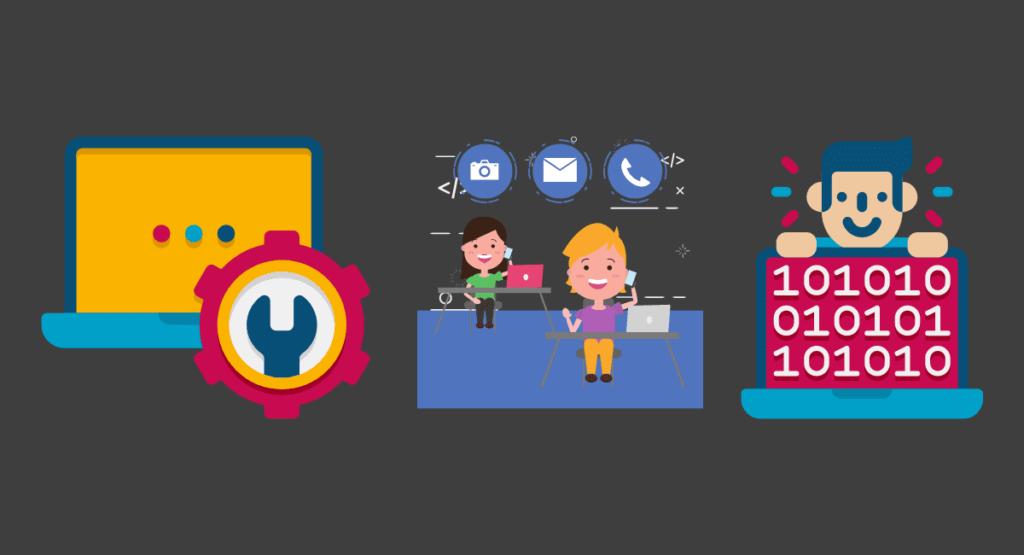The Top 5 IT Jobs That are Easy to Get Into


Are you looking for a high-paying IT job but don’t have the time or money to return to school for a computer science degree?
Don’t worry! Many IT professions don’t require any formal education.
This article will discuss the top 5 IT professions easy to get into without a university or college degree.
We will also provide information on IT certification requirements for each profession. So, whether you’re just starting your IT career or looking to switch jobs, read on for more details!
IT Career Paths
Of course, there are specialized fields of information technology in general. There are practically unlimited possibilities, from cyber security programming and website designing to robotic games and artificial intelligence, and positions span various career fields from entry-level to executive levels. We list some unique specialties in IT. And since information technology covers virtually every sector of the economy, most companies worldwide look into hiring IT talent. Those who frequently feature on IT employers’ lists include:
Product Manager
The best-paid job was the product manager in the list of most prestigious tech jobs. The product manager identifies the parameters around product development, and engineering teams then manage product development from concept to launch.
Product managers can implement a product strategy to achieve the strategic objectives, develop a marketing strategy, and contribute to the development.
Software architect
The second job that pays the most in tech is a software architect. Software architects optimize the development cycle by implementing design decisions and specifying technical requirements like software, tools, or platforms.
The team is responsible for developing prototypes that meet the user’s needs and executing practical work on a prototype.
DevOps Engineer
Currently, two jobs are available as DevOps engineers that pay more in tech. It can mean someone in the development teams who participate in deployment and operation networks or an operational person in the application development department.
DevOps engineers have specialized training in DevOps, including programming and scripting. DevOps knowledge is needed for deploying networks with familiarity with tools like Git and Jenkins and Knowledge of Linux/ Unix systems administration.
Cloud Architect
The next on the list are cloud architects and IT engineers. Cloud-based software developers are tasked with developing cloud infrastructure and cloud applications for organizations and coordinating their implementation.
A cloud architect can often have the skills necessary to design a cloud infrastructure, develop the cloud infrastructure and implement the cloud strategy, and coordinate the implementation and deployment of these applications.
Blockchain engineer
A cryptography engineer develops and implements blockchain technology architectures and solutions. Worldwide blockchain investment could be up 15 billion by 2023, which would mean a high demand for blockchain experts across industries and geographies.
A blockchain developer should possess excellent programming abilities and a thorough knowledge of the technologies of Bitcoin and Ethereum, as well as consensus methodologies.
Big Data Engineer
Internet usage generates 2.5 million bytes a day. Almost half of all companies have invested in the field of Big Data. Next on the list of top-paid IT jobs are certainly big data developers. Big Data architects are responsible for planning, designing, and implementing the entire life cycle of Big Data application development and deployment.
Get more out of your business
Get the best employee engagement content every week via mailing list
IT Professionals with No University or College Degrees

“…Go for it! IT is a fast-paced, growing, and changing industry. Demonstrating characteristics that show how you can embrace change, learn and solve business problems with tech will go a long way to getting a career in IT. “ Tracy Pound.
No matter what IT career you’re interested in, there’s likely a way to get into the field without a formal education. IT professionals are in high demand, and there are many opportunities for those without degrees. The most important thing is to have the right skills and knowledge. IT certification can help you demonstrate your expertise and stand out from other candidates.
So, what are the top IT jobs that are easy to get into without a degree? Here’s our list:
- IT Support Technician
- IT Systems Administrator
- Network Engineer
- Security Analyst
- Web Developer
With the right IT certification, you can enter into any of these professions and start your IT career.
IT professionals with experience and certification will be in high demand in the coming years.
IT Support Technician
An IT support technician is a professional engineer who provides IT support to organizations or individuals. They help maintain and repair computer systems and provide technical assistance to users.
IT support technicians typically have a diploma or degree in IT, but many opportunities exist for those without formal education. They may also have certification in IT support, which can demonstrate their expertise and help them stand out from other candidates.
IT Systems Administrator
An IT systems administrator is responsible for the day-to-day operation of a computer system. They may install, configure, and troubleshoot computer systems and maintain network security.
IT systems administrators typically have a degree in IT or a related field, but many opportunities exist for those without formal education. They may also have certification in IT systems administration, which can demonstrate their expertise and help them stand out from other candidates.
Professional Network Engineer
A professional network engineer is responsible for designing, implementing, and maintaining a computer network. They may work with Local Area Networks (LANs), Wide Area Networks (WANs), and Wireless Networks (WLANs).
Network engineers typically have a degree in IT or a related field, but many opportunities exist for those without formal education. They may also have certification in network engineering, which can demonstrate their expertise and help them stand out from other candidates.
Security Analyst
A security analyst professional is responsible for ensuring the security of a computer system. They may perform vulnerability assessments, penetration tests, and incident responses.
Employers will ask for the security certification of the candidate since the position is crucial in their IT system to protect their data and IT networks.
Web Developer
A web developer is responsible for developing, designing, and maintaining websites. They may work with HTML, CSS, and JavaScript to create website front-ends and back-ends.
Web developers should have a portfolio of their expertise that will stand out from other candidates.
IT Certification Requirements for Each Profession
IT certifications give employers the confidence that you have the skills and knowledge required, even if you don’t have a college degree. Here are some IT certifications requirements for each profession:
IT Support Technician
IT support technician typically needs the relevant IT certification, such as:
- CompTIA A+
CompTIA A+ is an entry-level IT certification covering basic IT concepts and troubleshooting skills.
- Network+.
Network+ is a mid-level IT certification that covers networking concepts and troubleshooting skills.
IT Systems Administrator
System administrators typically need relevant IT certifications, such as CompTIA Network+, Microsoft Certified Solutions Associate (MCSA), and Cisco Certified Network Associate (CCNA).
- CompTIA Network+ is a mid-level IT certification covering networking concepts and troubleshooting skills.
- Microsoft Certified Solutions Associate (MCSA) covering Microsoft Windows Server administration.
- Cisco Certified Network Associate (CCNA) is a mid-level IT certification covering Cisco networking concepts and troubleshooting skills.
- IT administrator certification from Microsoft or CompTIA
- ITIL certification
Network Engineer
Network engineers typically need relevant IT certifications, such as CompTIA Network+, Cisco Certified Network Associate (CCNA), and Cisco Certified Internetwork Expert (CCIE).
- CompTIA Network+ is a mid-level IT certification covering networking concepts and troubleshooting skills.
- Cisco Certified Network Associate (CCNA) is a mid-level IT certification covering Cisco networking concepts and troubleshooting skills.
- Cisco Certified Internetwork Expert (CCIE) covering Cisco networking concepts and troubleshooting skills.
IT Security Professional
- GIAC certified security professional (GSEC)
- CompTIA security+ certification
- Certified Information Systems Auditor (CISA) certification
- Certified Information Security Manager (CISM) certification
- Certified Ethical Hacker (CEH) certification
IT Security professionals with one or more of these certifications will be in high demand in the coming years.
Web Developer
Web Developer professional with experience in customizing WordPress themes and developing front-end code using HTML, CSS, and JavaScript.
- Certified in Advanced Customization of WordPress Themes
- Certified Front-End Web Development from Codecademy.
How to Succeed in the IT Field Without a Degree?
When looking for IT jobs, you should be noticed by potential employers by your skills, portfolio, and certification. IT is a field where practical experience goes a long way towards helping you get hired.
Succeeding in an IT career means getting the job you want and keeping it for a long time. IT is not like other careers where if you do not have a degree, your chances of getting jobs are very slim.
IT offers big chances for those who wish to pursue a career in this field without obtaining an IT-related degree.
Get an IT Certifications.
One of the career paths to succeed in the IT field without a degree is to become certified. IT certification can demonstrate your proficiency in specific IT areas and make you a more desirable employer candidate.
Popular IT certifications include Cisco Certified Network Associate (CCNA), Microsoft Certified Systems Engineer (MCSE), and CompTIA A+.
IT professionals can obtain certifications through online courses or in-person training. Many IT certification programs require you to pass an exam to receive the certificate.
Some companies may also offer internal IT certification programs that you can take advantage of. These programs are usually specific to their products or services and can help you learn more about using them effectively.
IT certifications can be a great way to make yourself more marketable in the IT field and could help you get a job without a degree.
- Cisco Certified Network Associate (CCNA) Routing and Switching is an entry-level certification that will allow you to demonstrate your proficiency in networking. The exam covers IP addresses, subnetting, and network fundamentals. A CCNA certified needs to pass the Cisco 200-125 exam.
- The Microsoft Certified Solutions Associate (MCSA) is divided into three sub-categories: Windows Server, Messaging, and Mobility. To become MCSA certified, you will need to pass one of the following exams: 70-410, 70-411, or 70-412.
- The CompTIA A+ certification is a vendor-neutral IT certification covering various topics, including hardware, networking, and troubleshooting. The candidate should be passed the test of IT fundamentals and more advanced IT topics. To become CompTIA A+ certified, you will need to pass both exams.
Networking in the IT industry
Like other professions, you should make connections and try to get an IT job related to your field. Do not just focus on one IT job only. Make a list of companies you want to work for, and start networking with individuals working in those companies.
Attend IT conferences or meetups, and introduce yourself to as many people as possible. Having many connections might help you land your dream IT job.
Future IT professions
In the future, there will be new IT professions, such as those related to Blockchain engineering and Cloud.
IT is essential to many industries, and its prominence will continue to grow. IT salaries are high, and IT jobs are flexible, making them perfect for those who want to change careers or become their own boss.
The skills required for the IT profession
The IT profession is a field that requires a variety of skills. IT professionals need to be able to solve problems, communicate effectively, and work independently. They also need to learn new technologies quickly and keep up with the latest trends.
IT professionals also need to have strong technical skills. They need to be able to work with networks, computers, and software. They also need capabilities in troubleshoot problems and fix them quickly.
Always learn new things and have a strong interest in technology. You should also have good problem-solving skills and be able to work independently. It is also helpful if you have some technical experience or are certified in IT.
How to stay ahead in the industry
In a technology-driven world, it’s no secret that the IT industry is constantly evolving. As an IT professional, it’s essential to stay ahead of the curve and keep up with the latest trends and technologies. Tips for you to stay ahead in the IT industry:
1) Stay current on new technologies.
2) Attend IT conferences and training sessions.
3) Network with other IT professionals.
4) Subscribe to IT publications and newsletters.
5) Keep up to date with the IT industry news.
Frequently Ask Questions (FAQ)
What is the best IT job to have?
Here are some great tech career options for an IT Director. Software Engineer Web developers. Databank Administrator IT Consultant IT Support Specialist Cyber Security Analyst
Which IT jobs in demand?
The most in-demand IT jobs include Mobile app developers. Software as a service (SaaS) experts. Cloud computing specialists. Cybersecurity analysts and engineers. Data science and analytics professionals. Artificial intelligence and machine learning experts.
What is the highest paying IT job?
Some of the highest paying IT jobs are solution architects, senior web developers, IT project managers, DevOps Managers, directors of Information Technology, principal Software Engineers, Enterprise Architects.
What are some good entry-level IT jobs?
Entry-level IT jobs include: help desk technicians, junior software developers/engineers, test engineers/QA analysts, and quality assurance testers.
Conclusion
The IT profession is constantly changing and evolving, so it’s essential to stay up-to-date on the latest technology and solutions.
You have many ways to learn about new technology and how to use it in your career. Keep learning and expanding your skillset, and you’ll be ready for whatever the IT field throws your way.


